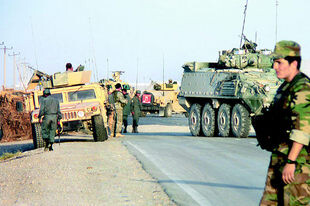hankyoreh
Links to other country sites 다른 나라 사이트 링크
Afghan hostage crisis vexes South Korean Press

By Kang Kyung-ran, freelance journalist
I could not help but feel ashamed when an Afghan journalist made
“South Koreans, particularly the South Korean media, has no idea about the hostage crisis in Afghanistan at all.”
The journalist is serving as a local correspondent for a major newspaper in South Korea. “Though I send report everyday to the newpaper, it’s unclear to me how
With not a single Korean journalist stationed here, the foreign news media dominate the reports on the South Korean hostages. But the foreign news media, based in the Afghan capital of Kabul, rely heavily on local correspondents for their reports. Most of these local correspondents worked at Ghazni or Kandahar and usually collect information form Taliban informants or elders in local tribes. This kind of information is then reported by the foreign news media. For local correspondents with relatively good knowledge of the inner workings of the Taliban, many Western news outlets, as well as media organizations from South Korea and Japan, want to hire them.
As it is very rare for journalists to make direct contact with Taliban leaders, the competition among the foreign news media is regarded by their local correspondents as a war of information. The accuracy of information is dependant upon how close a local correspondent can get to the Taliban’s stronghold.
Let me show you an example. On Aug. 1, some news reports claimed that the South Korean government delegation had met with some of the hostages. At that time, the South Korean and Japanese media claimed, “It’s certain that the South Korean government delegation met the hostages. We confirmed this fact through the Taliban and local residents.” However, a Pakistani journalist denied these reports, citing his telephone conversation with Abdullah(Abu Mansur) , who is believed to be the mastermind behind the kidnapping.
Given the current situation, there is another question: what more could Korean journalists do here if they were to rely solely on local correspondents, as the foreign news media do?
Another frustration comes from the South Korean media and the government, who have been publishing the remarks of purported Taliban spokesman Qari Yousef Ahmadi. Almost everyday, the purported spokesman has telephoned foreign journalists and given updates about the Taliban’s activities, such as where the Taliban attacked or how many NATO soldiers died and how many Taliban victims there were.
But the foreign journalists in Kabul say that two or three people may be using the name “Ahmadi.” The journalists, who receive Ahmadi’s telephone calls, say that the purported spokesman’s voice has changed from time to time. Ahmadi has also frequently changed telephone numbers and uses five to six different telephone numbers to make calls. Some say Ahmadi’s telephone number once changed three times in one hour.
The South Korean hostage crisis in Afghanistan has demonstrated that on-site reporting is not always the best method for journalists whose nation may have an interest in the issue at hand but who are themselves far-removed from the country in which a given incident is taking place. The Afghan Islamic Press, which is believed to have ties with the Taliban, is gaining attention with its relatively fast and accurate reports. Based in Pakistan, the AIP accurately reported on the Taliban’s moves in Ghazni city via telephone and the Internet. The AIP can be viewed as the symbol of a journalism that is facing a borderless war.
Editorial・opinion
![[Guest essay] Amending the Constitution is Yoon’s key to leaving office in public’s good graces [Guest essay] Amending the Constitution is Yoon’s key to leaving office in public’s good graces](https://flexible.img.hani.co.kr/flexible/normal/500/300/imgdb/original/2024/0416/8917132552387962.jpg) [Guest essay] Amending the Constitution is Yoon’s key to leaving office in public’s good graces
[Guest essay] Amending the Constitution is Yoon’s key to leaving office in public’s good graces![[Editorial] 10 years on, lessons of Sewol tragedy must never be forgotten [Editorial] 10 years on, lessons of Sewol tragedy must never be forgotten](https://flexible.img.hani.co.kr/flexible/normal/500/300/imgdb/original/2024/0416/8317132536568958.jpg) [Editorial] 10 years on, lessons of Sewol tragedy must never be forgotten
[Editorial] 10 years on, lessons of Sewol tragedy must never be forgotten- [Column] A death blow to Korea’s prosecutor politics
- [Correspondent’s column] The US and the end of Japanese pacifism
- [Guest essay] How Korea turned its trainee doctors into monsters
- [Guest essay] As someone who helped forge Seoul-Moscow ties, their status today troubles me
- [Editorial] Koreans sent a loud and clear message to Yoon
- [Column] In Korea’s midterm elections, it’s time for accountability
- [Guest essay] At only 26, I’ve seen 4 wars in my home of Gaza
- [Column] Syngman Rhee’s bloody legacy in Jeju
Most viewed articles
- 1[Guest essay] Amending the Constitution is Yoon’s key to leaving office in public’s good graces
- 2[Editorial] 10 years on, lessons of Sewol tragedy must never be forgotten
- 3Faith in the power of memory: Why these teens carry yellow ribbons for Sewol
- 4Final search of Sewol hull complete, with 5 victims still missing
- 5[Guest essay] How Korea turned its trainee doctors into monsters
- 6How Samsung’s promises of cutting-edge tech won US semiconductor grants on par with TSMC
- 7Korea ranks among 10 countries going backward on coal power, report shows
- 8Pres. Park an accomplice in ordering resignation of CJ Group vice chairman
- 9[News analysis] Watershed augmentation of US-Japan alliance to put Korea’s diplomacy to the test
- 10K-pop a major contributor to boom in physical album sales worldwide, says IFPI analyst